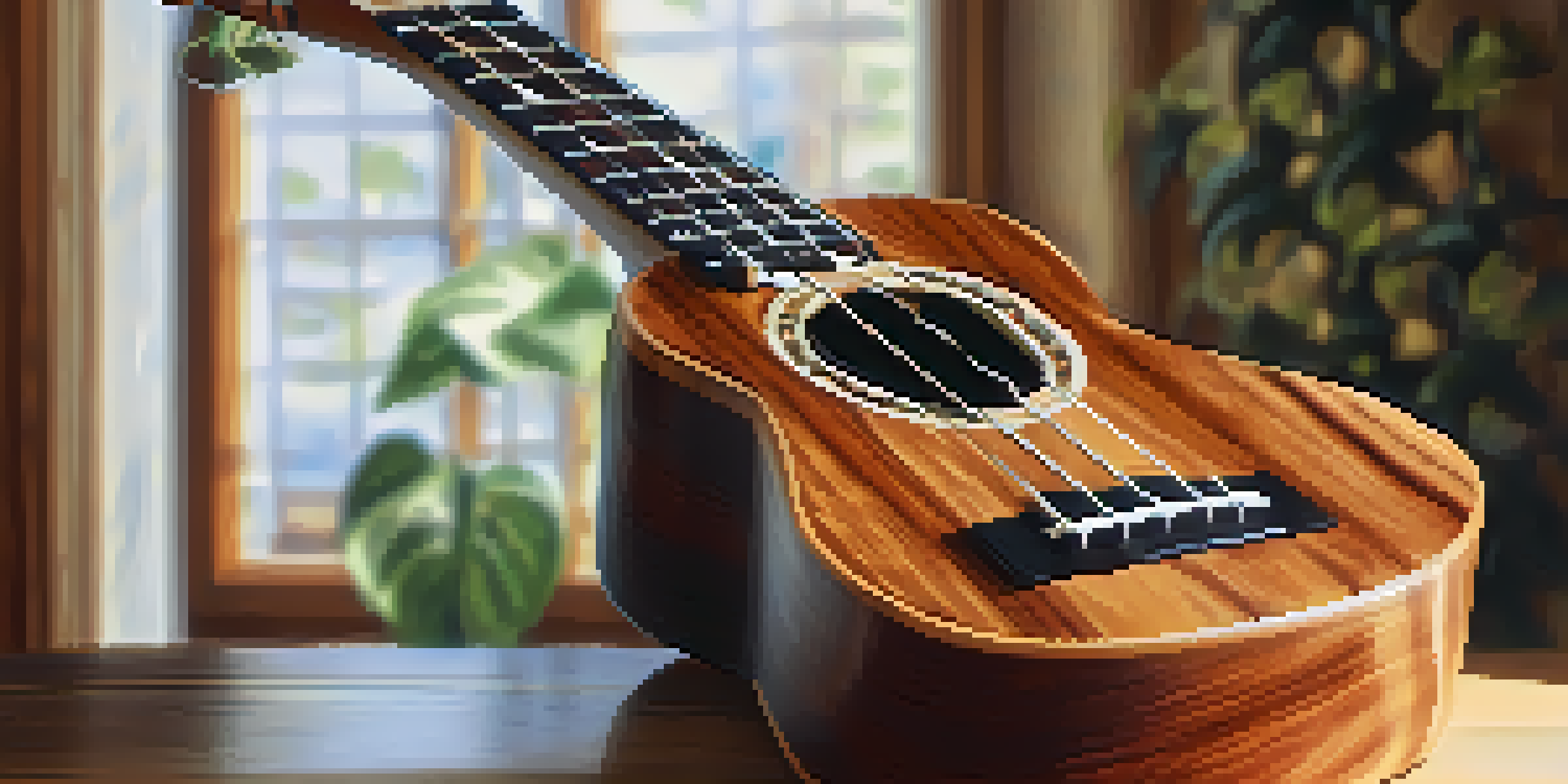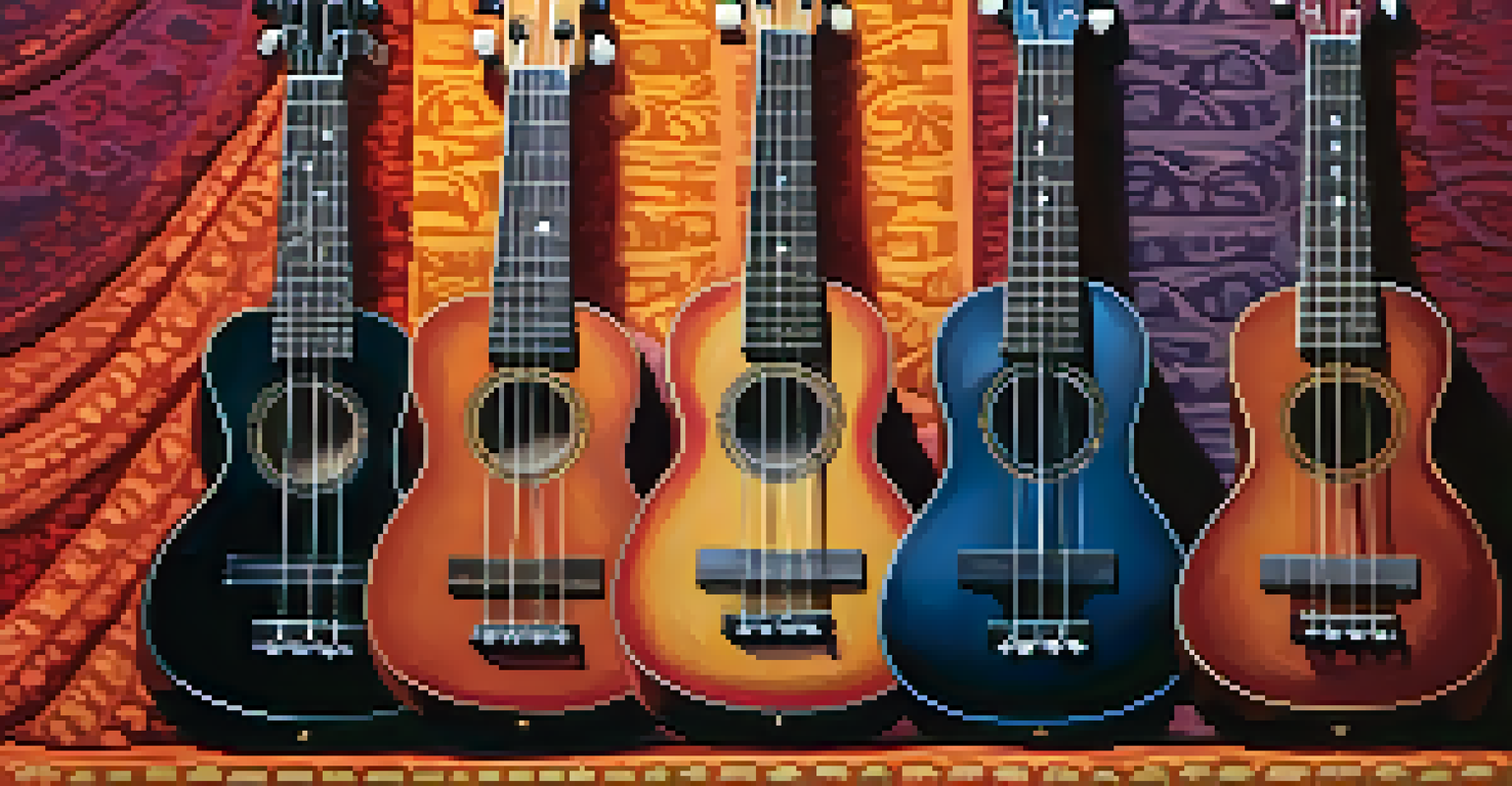Choosing Your First Ukulele: Size and Material Explained

Understanding Ukulele Sizes: Soprano, Concert, and More
When starting your ukulele journey, size matters. Ukuleles come in four main sizes: soprano, concert, tenor, and baritone, each offering a unique sound and feel. The soprano, often considered the 'classic' ukulele, is small and great for children or those with smaller hands.
Music is the shorthand of emotion.
Concert ukuleles are slightly larger, providing a fuller sound while still being manageable for beginners. If you prefer a deeper tone, the tenor ukulele might be your best bet, as its larger body produces richer sounds. Lastly, baritone ukuleles resemble guitars more closely, so they are ideal for players who may already have guitar experience.
Choosing the right size is crucial, as it affects not only playability but also the sound you’ll produce. Consider trying different sizes in a music store to find which one feels and sounds best for you.
How Ukulele Materials Influence Sound Quality
The materials used in ukulele construction significantly impact the instrument's sound quality. Generally, ukuleles are made from wood or a combination of wood and synthetic materials. Solid woods like mahogany, koa, or spruce are popular choices and tend to produce richer, warmer tones compared to laminate woods, which are more affordable but may lack depth.

Koa wood, in particular, is cherished for its beautiful aesthetics and balanced tone, making it a favorite among ukulele enthusiasts. On the other hand, if durability and price are your main concerns, you might opt for a plastic or laminate ukulele, which can still sound good and withstand wear and tear.
Choose the Right Ukulele Size
Selecting the appropriate ukulele size affects both playability and sound quality, making it essential to try different options.
Ultimately, the material you choose can elevate your playing experience. Consider what sound appeals to you and how much you're willing to invest in your first instrument.
The Importance of Playability in Your Ukulele Choice
Playability refers to how easy and comfortable it is to play your ukulele. Factors such as neck width, string height, and overall weight come into play here. A wider neck may be challenging for small hands, while a lighter ukulele can make long practice sessions more enjoyable.
The beautiful thing about learning is that no one can take it away from you.
Testing out different models in a music store is a great way to assess playability. Hold them, strum a few chords, and see how they feel. You want an instrument that feels good in your hands and inspires you to play daily.
Remember, a ukulele that feels good to play will encourage you to practice and enjoy making music. So, take your time finding the perfect fit.
Exploring Acoustic vs. Electric Ukuleles
Another consideration is whether you want an acoustic or electric ukulele. Acoustic ukuleles produce sound through their hollow bodies, making them great for casual playing or small gatherings. They often have a warmer, more traditional sound, perfect for playing in a park or at home.
On the other hand, electric ukuleles have built-in pickups that allow you to amplify the sound, making them suitable for performances or larger venues. They can be plugged into an amplifier for a louder output, which is ideal if you plan to play with a band or in front of an audience.
Consider Materials for Sound Quality
The materials used in ukulele construction, such as solid woods versus laminates, significantly influence the instrument's sound and tone.
Think about where you’ll be playing most often. If you envision strumming on your porch, an acoustic might be more fitting. If you want to perform, consider investing in an electric ukulele.
Finding the Right Brand for Your First Ukulele
With numerous brands on the market, selecting the right one can be daunting. Some well-known brands like Kala, Lanikai, and Cordoba offer a range of quality ukuleles suitable for beginners. It's wise to do a bit of research, read reviews, and possibly seek recommendations from local music shops.
Each brand has its unique sound and build quality, so don’t hesitate to try several options. Remember, the best ukulele is one that not only sounds good but also feels right for you. A reputable brand often means better craftsmanship, which can enhance your playing experience.
Investing in a reliable brand can provide peace of mind, knowing you're starting with a quality instrument that will last as you grow in your musical journey.
Setting a Budget: What to Expect for Your First Ukulele
Budget is an essential factor in selecting your first ukulele. Prices can range from as low as $30 for entry-level models to several hundred dollars for higher-end instruments. While it might be tempting to go for the cheapest option, remember that quality matters—especially when you're just starting.
A good rule of thumb is to aim for a ukulele in the $50 to $150 range. This price point often yields a decent instrument that sounds good and is easier to play. Investing a little more can also save you from the frustration of dealing with a poorly made ukulele.
Set a Realistic Budget
Establishing a budget between $50 to $150 can help you find a quality ukulele that enhances your playing experience without breaking the bank.
Ultimately, consider how much you're willing to spend and what features are most important to you. A well-chosen ukulele at a reasonable price can spark your passion for music.
Maintaining Your Ukulele: Tips for Longevity
Once you’ve chosen your ukulele, knowing how to maintain it is crucial for its longevity. Regular cleaning and proper storage can significantly extend its life. Remember to wipe down the strings and body after each use to remove oils and dirt from your hands.
Keeping your ukulele in a case when not in use helps protect it from dust and potential accidents. Moreover, be mindful of humidity levels, as extreme changes can warp the wood over time. Consider using a hygrometer to monitor the environment.

Finally, don't hesitate to change strings regularly, as worn strings can affect sound quality. With a bit of care, your ukulele will accompany you through many musical adventures.